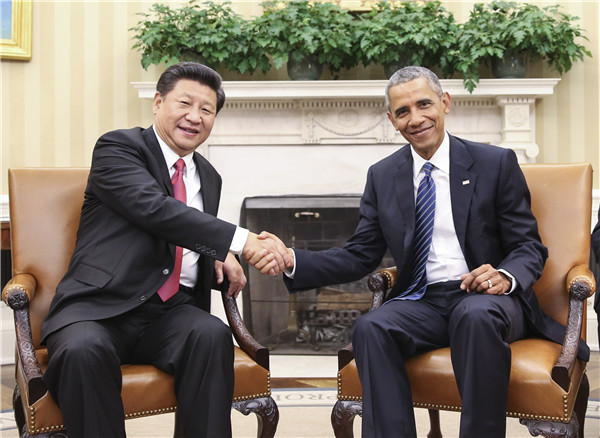It may be too early to tell, but one would not risk ridicule by claiming that the just-concluded U.S.-China summit has accomplished its most important, albeit intangible, objective: temporarily arresting the downward spiral in the ties between Washington and Beijing.

Chinese President Xi Jinping (L) shakes hands with U.S. President Barack Obama (R) during their talks in Washington D.C., the United States, Sept. 25, 2015. (Xinhua/Lan Hongguang)
During the two-day summit in Washington, both Presidents Barack Obama and Xi Jinping did their best to underscore the positive aspects of the U.S.-China relationship while attempting to address the issues that have been pushing the two countries toward an increasingly confrontational direction. In this respect, it is the tone, not the substance, that matters.
For President Xi, who has consistently projected a strongman image at home, the persona he assumed during his U.S. trip was remarkable. He appeared conciliatory and intent on seeking common ground, not confrontation. Staying on message, he repeatedly reassured his American hosts that China has no desire to make itself America’s enemy. President Obama took equally big risks trying to accentuate the positive. On the eve of the summit, the administration was under enormous pressure to announce sanctions against Chinese entities and individuals for alleged commercial cyber espionage. But this step, which could have scuttled the summit, was wisely postponed. In his public remarks, even as he listed areas where Washington and Beijing have serious differences, President Obama nevertheless emphasized that the U.S. will continue to work with China to resolve them.
In terms of concrete achievements of the summit, the most crucial agreement between the two presidents was a “common understanding” on banning state-sponsored cyber theft of intellectual property. To be sure, detailed rules that will turn this understanding into a binding document have yet to be negotiated, and there is no guarantee that Beijing and Washington will be able to agree on them soon. Such an understanding should be a welcome first step. If nothing else, this signals that both governments are ready to confront perhaps one of the trickiest but also most divisive problems in their bilateral relations.
Another encouraging development, though credited to China and not the U.S., was the announcement by President Xi that Beijing would launch a system of trading greenhouse gas emission rights in 2017. Obviously, this unilateral gesture was meant to gain additional goodwill from President Obama, who is deeply committed to leading a global collective effort on this front.
As for a bilateral investment treaty (BIT), a much-needed agreement to remove existing obstacles to capital flows between the two countries, no substantive progress was made during the summit. The two countries announced only that they will more vigorously pursue an agreement. As strong opposition to this deal exists in both countries and many, if not most, complex technical details have yet to be ironed out, Washington and Beijing may have to work much harder to strike a bargain. Because President Obama has only 15 months left in office, the window for a U.S.-China BIT is rapidly closing.
As expected, the summit produced no progress on the South China Sea disputes except for a verbal commitment by President Xi that China will not “militarize” the artificial islands. Some observers regard this pledge, the first made by China’s top leader, as a significant breakthrough. But others are more skeptical because “militarization” can mean many things to many people. For instance, China has largely finished building runways on some of the reclaimed islands that can be used by both civilian and military aircraft. Does this amount to “militarization”?
Those who counted on President Obama to pressure his Chinese counterpart on human rights must feel sorely disappointed. Out of an understandable desire not embarrass or confront Mr. Xi, President Obama did not allow this issue to overshadow the summit.
The fairest assessment of the Obama-Xi summit is that, while it has provided urgent relief in stabilizing U.S.-China relations, it needs many follow-through actions to fundamentally change the adversarial dynamics now driving this fragile relationship. To borrow a Russian proverb that has become a favorite of American politicians, “trust but verify,” it is critical that China take three steps in the near future to reassure the U.S. that what President Xi said in Washington is no empty promise.
The first step is an immediate cessation of cyber intrusions against civilian American companies. The U.S. will be monitoring such intrusions closely in the coming months and, if previous patterns of Chinese activities are observed, Beijing risks losing its credibility.
The second step is to suspend construction activities on the reclaimed islands in the South China Sea, in particular those related to structures that have direct military applications, such as runaways and radar facilities. Such restraint, however costly, is necessary if Beijing wants to honor its pledge not to “militarize” these islands.
The third step is to initiate substantive negotiations with the U.S. on a set of rules governing the cyberspace, with special focus on the prevention of commercial espionage through cyber intrusions and the establishment of verification regimes. This will demonstrate, again, Beijing’s good faith.
For President Xi, taking these steps will unavoidably incur heavy political costs because they appear to be concessions to Washington. But he should not fear to take risks. Having concentrated immense power in his office, he has little to fear from those who dare to challenge his authority. Most importantly, such risks are worth taking because these steps will help put the shaky U.S.-China relationship on a far more solid footing.
